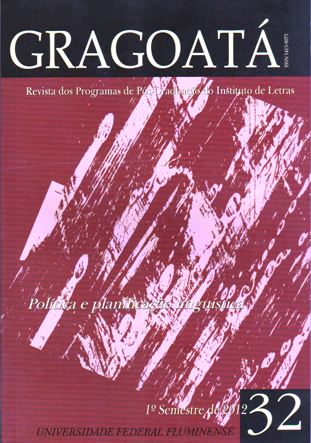Combatting and preserving: positions and knowledge about the popular language in the "Boletines de la Academia Argentina de Letras" (1933-1943)
DOI:
https://doi.org/10.22409/gragoata.v17i32.33041Keywords:
Language Policies, Academia Argentina de Letras, popular language, Lunfardo, folklore, traditionAbstract
This paper presents an analysis of the positions and knowledge about popular language made by the Boletines de la Academia Argentina de Letras (BAAL) during the first ten years of publication (1933-1943). This is a recurring problem in BAAL, whose historical significance was deepened from the socio-economic, political and cultural changes on that took place since the early 1930s. Theoretically, this paper is based on the studies of Glotopolitcs currently developed in Argentina, considering perspectives from different approaches though. Methodologically, this work discusses formulations about Argentina, language and genres associated with popular cultura correspond to the same political and institutional positioning. Because of its discursive importance, the analysis especially discusses the functioning of the rural-urban dichotomy, favoring two axes: a) the relationship between general policy definitions which are formulated in BAAL and positions on popular culture and language and b)the specialized knowledge which build the lunfardo, folklore and folk poetry as objects of description and prescription. Thus, the paper aims at covering the ways in which the Academia Argentina de Letras helped to institutionalize a popular language imaginary linked, on one hand, to a certain definition of tradition and, on the other, to politicies of exclusion of practices associated with popular urban space.
---
Original in Spanish.
Downloads
Downloads
Published
How to Cite
Issue
Section
License
Authors who publish in Gragoatá agree to the following terms:
The authors retain the rights and give the journal the right to the first publication, simultaneously subject to a Creative Commons license CC-BY-NC 4.0, which allows sharing by third parties with due mention to the author and the first publication by Gragoatá.
Authors may enter into additional and separate contractual arrangements for the non-exclusive distribution of the published version of the work (for example, posting it in an institutional repository or publishing it in a book), with recognition of its initial publication in Gragoatá.

Gragoatá is licensed under a Creative Commons - Attribution-NonCommercial 4.0 International.











